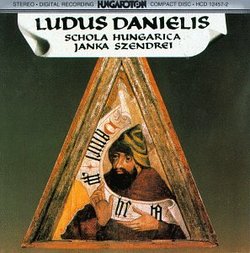| All Artists: Schola Hungarica, Janka Szendrei (Conductor) Title: Ludus Danielis (The Play of Daniel) - Schola Hungarica / Janka Szendrei Members Wishing: 0 Total Copies: 0 Label: Hungaroton Release Date: 4/18/1994 Album Type: Import Genres: Special Interest, Classical Styles: Holiday & Wedding, Historical Periods, Early Music Number of Discs: 1 SwapaCD Credits: 1 UPCs: 750582154522, 5991811245726 |
Search - Schola Hungarica, Janka Szendrei (Conductor) :: Ludus Danielis (The Play of Daniel) - Schola Hungarica / Janka Szendrei
 | Schola Hungarica, Janka Szendrei (Conductor) Ludus Danielis (The Play of Daniel) - Schola Hungarica / Janka Szendrei Genres: Special Interest, Classical
This performance of The Play of Daniel is the most effective recreation of the sound and spirit, the dramatic essence, of a medieval mystery play ever put on disc. The liturgical drama was an important part of the mediev... more » |
Larger Image |
CD DetailsSynopsis
Amazon.com This performance of The Play of Daniel is the most effective recreation of the sound and spirit, the dramatic essence, of a medieval mystery play ever put on disc. The liturgical drama was an important part of the medieval church's need to keep the people in touch with the great and awesome doctrinal mysteries. It also gave an opportunity for musical expression of a different kind to men and children who normally sang the liturgy in the cathedrals and monastery schools. This play contains some of the most beautiful music found in any medieval source, and it's performed here with exceptional singers--men, women, and children--who achieve a perfect synthesis between the play's dramatic requirements and the music's expressive function. This disc is one of a kind; a treasure, one of the gems of the early music catalog. --David Vernier Similar CDs
|
CD ReviewsA turning point in the cultural history of the Middle Ages Jacques COULARDEAU | OLLIERGUES France | 05/09/2001 (5 out of 5 stars) "This Opera created in the thirteenth century in a French Cathedral is probably the first ever church opera composed and performed, three centuries before those of the Italian Renaissance. It is a real jewel. First the voices are clear and extremely refined and to the point in their choice and expressivity. Then the music is a real surprise. The music is both church music, at times, and popular music at other times. This alternation is typical of a certain religious practice in the Middle Ages : the mixing of dense religious and gregorian music, most of the time a capella, and a light, joyful, gay and popular music, closer to dances and to celebrations around a fire on the village square, the music playing along with the singing, than to a psalm or hymn. We can also find some court music when the Queen comes in for instance. And it is not rare to hear some oriental coloration on a couple of pieces, showing the wide array of influences and inspirations collected in this opera.But the turning point of the opera is the transformation of King Darius into a donkey. This is a direct echo of the common practice, for Christmasd and the New Year, in the Middle Ages of having Feasts of Fools performed in churches and celebrating God and Jesus by putting upside down the normal secular and material power hierarchy, just as Jesus promised that the first one will come last and the last one will come first at doomsday. This was completely accepted by the church, and here a cathedral. This is an essential element in the real deep involvement of the Church in everyday life, in the life of simple people, and at the highest level. It is also a strong and powerful evidence that the Church was able in those days to recuperate or simply use all forms of creativity, here musical creativity, to win people over and to make them feel at home in the Church.This opera is one essential and beautiful moment in the thirteenth century musical revolution that will lead to and at the same time find momentum in the Avignon Popes. It is the drama of overpopulation at the end of the thirteenth century, and then of the plague known as Black Death, and all the struggles and « heresies » that will come along with those two events that will isolate and break the energy of this cultural revolution. Dr Jacques COULARDEAU, Paris Universities II and IX."
|

 Track Listings (19) - Disc #1
Track Listings (19) - Disc #1
